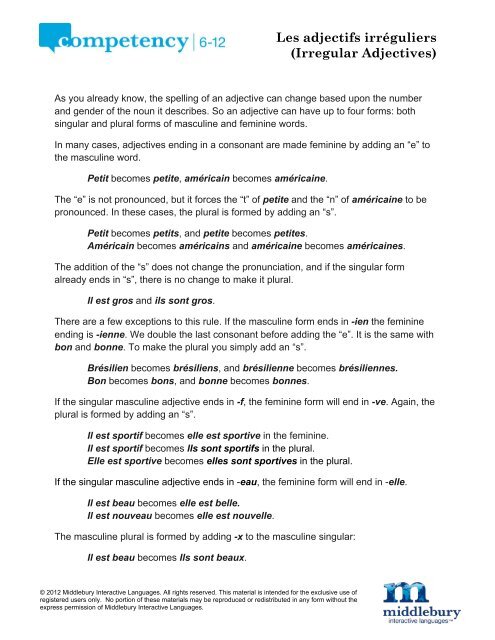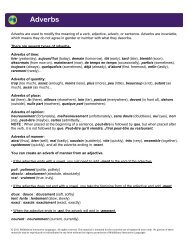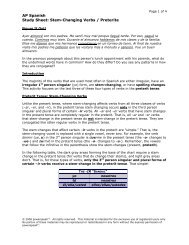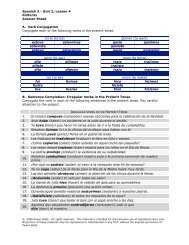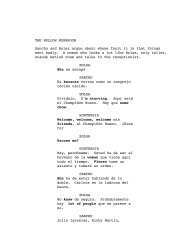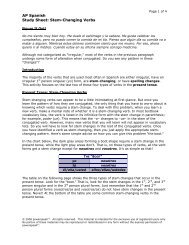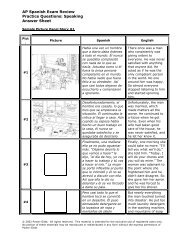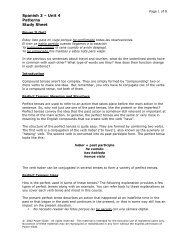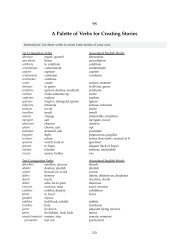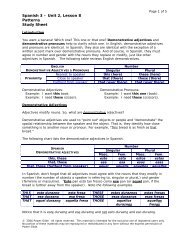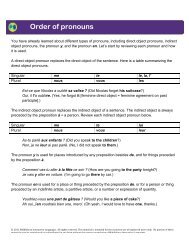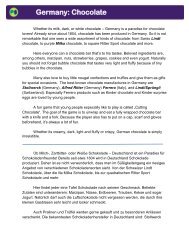Les adjectifs irréguliers (Irregular Adjectives)
Les adjectifs irréguliers (Irregular Adjectives)
Les adjectifs irréguliers (Irregular Adjectives)
Create successful ePaper yourself
Turn your PDF publications into a flip-book with our unique Google optimized e-Paper software.
<strong>Les</strong> <strong>adjectifs</strong> <strong>irréguliers</strong><br />
(<strong>Irregular</strong> <strong>Adjectives</strong>)<br />
As you already know, the spelling of an adjective can change based upon the number<br />
and gender of the noun it describes. So an adjective can have up to four forms: both<br />
singular and plural forms of masculine and feminine words.<br />
In many cases, adjectives ending in a consonant are made feminine by adding an “e” to<br />
the masculine word.<br />
Petit becomes petite, américain becomes américaine.<br />
The “e” is not pronounced, but it forces the “t” of petite and the “n” of américaine to be<br />
pronounced. In these cases, the plural is formed by adding an “s”.<br />
Petit becomes petits, and petite becomes petites.<br />
Américain becomes américains and américaine becomes américaines.<br />
The addition of the “s” does not change the pronunciation, and if the singular form<br />
already ends in “s”, there is no change to make it plural.<br />
Il est gros and ils sont gros.<br />
There are a few exceptions to this rule. If the masculine form ends in -ien the feminine<br />
ending is -ienne. We double the last consonant before adding the “e”. It is the same with<br />
bon and bonne. To make the plural you simply add an “s”.<br />
Brésilien becomes brésiliens, and brésilienne becomes brésiliennes.<br />
Bon becomes bons, and bonne becomes bonnes.<br />
If the singular masculine adjective ends in -f, the feminine form will end in -ve. Again, the<br />
plural is formed by adding an “s”.<br />
Il est sportif becomes elle est sportive in the feminine.<br />
Il est sportif becomes Ils sont sportifs in the plural.<br />
Elle est sportive becomes elles sont sportives in the plural.<br />
If the singular masculine adjective ends in -eau, the feminine form will end in -elle.<br />
Il est beau becomes elle est belle.<br />
Il est nouveau becomes elle est nouvelle.<br />
The masculine plural is formed by adding -x to the masculine singular:<br />
Il est beau becomes Ils sont beaux.<br />
© 2012 Middlebury Interactive Languages. All rights reserved. This material is intended for the exclusive use of<br />
registered users only. No portion of these materials may be reproduced or redistributed in any form without the<br />
express permission of Middlebury Interactive Languages.
<strong>Les</strong> <strong>adjectifs</strong> <strong>irréguliers</strong><br />
(<strong>Irregular</strong> <strong>Adjectives</strong>)<br />
In front of a masculine noun that starts with a vowel or an “h”, beau becomes bel, and<br />
nouveau becomes nouvel.<br />
C’est un bel homme.<br />
C’est un nouvel ordinateur.<br />
The feminine plural is formed by adding -s to the feminine singular.<br />
Elle est belle becomes elles sont belles.<br />
Elle est nouvelle becomes elles sont nouvelles.<br />
If the singular masculine adjective ends in -eux, the feminine form will end in -euse.<br />
Il est heureux becomes elle est heureuse.<br />
The plural for a masculine adjective ending in -eux remains the same as the singular<br />
form.<br />
Il est heureux becomes ils sont heureux in the plural.<br />
However, elle est heureuse becomes elles sont heureuses in the plural.<br />
One important exception is the adjective vieux. In front of a masculine noun that starts<br />
with a vowel or an “h”, it will become vieil, and in the feminine singular, it will appear as<br />
vieille.<br />
To recap, here’s a chart of some of the adjectives we have discussed.<br />
Masculine Masc. before Feminine Masculine Feminine<br />
singular<br />
vowel<br />
singular plural<br />
plural<br />
petit - petite petits petites<br />
brésilien - brésilienne brésiliens brésiliennes<br />
bon - bonne bons bonnes<br />
sportif - sportive sportifs sportives<br />
heureux - heureuse heureux heureuses<br />
vieux vieil vieille vieux vieilles<br />
beau bel belle beaux belles<br />
nouveau nouvel nouvelle nouveaux nouvelles<br />
Adjective agreement with number and gender is very important in French so you will<br />
want to practice it well.<br />
<strong>Les</strong> <strong>adjectifs</strong> <strong>irréguliers</strong> © 2012 Middlebury Interactive Languages. Page 2


